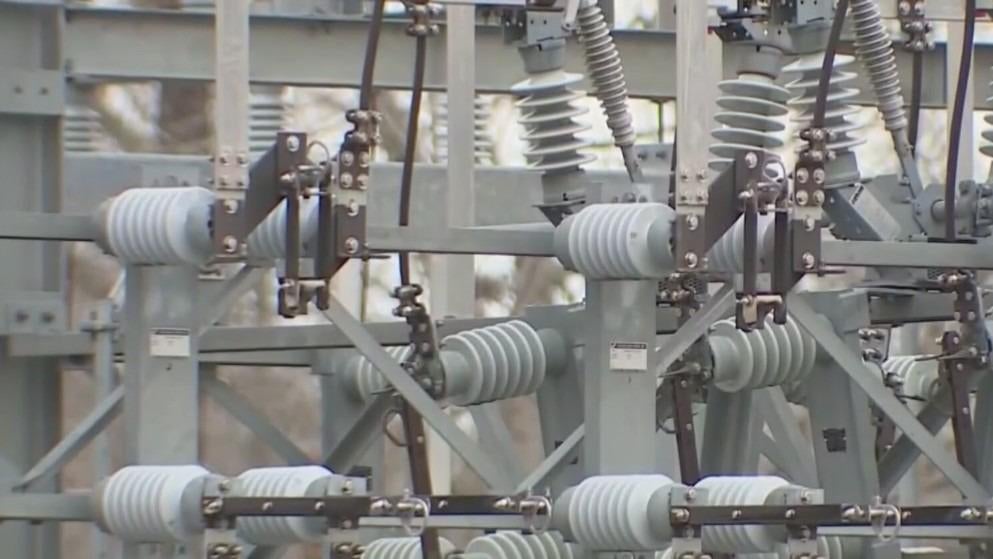Neo-Nazi leader on trial in Maryland for alleged terrorist plot to destroy Baltimore-area power grid
BALTIMORE -- The trial of a Florida man completed it's third day in federal court in Baltimore on Wednesday for an alleged terrorist plot to destroy the power grid in the Baltimore region.
According to court documents, Brandon Clint Russell, 29, of Orlando, Fla., planned to carry out attacks against electrical substations between 2022 and 2023 in furtherance of his neo-Nazi beliefs.
The trial began with jury selection on Monday, which concluded Tuesday morning. The court then heard opening statements from both the prosecution and defense, as well testimony from two prosecution witnesses.
On Wednesday, the court heard from an FBI informant who walked the jury through recorded phone calls and messages between the informant and profiles associated with Russel, and Sarah Beth Clendaniel.
Day 3 Highlights
A confidential FBI informant revealed details Wednesday of his work infiltrating online groups to gather evidence about an alleged plot to attack Maryland power grids, including conversations with suspects Brandon Russell and Sarah Beth Clendaniel. It's a job he said he's done for four years.
The informant, who works as a researcher specializing in extremism and domestic terrorism, testified that he was initially recruited through an FBI agent acquaintance. He received $40,000 for his services plus $30,000 in expense reimbursements across several investigations, having previously worked as a federal contractor drafting economic sanctions policy.
Prosecutors presented extensive evidence including text messages, photos, and recorded conversations between the informant and online users allegedly linked to Russell and Clendaniel. The discussions covered planning elements including how to "maximize impact" on power grids and obtain weapons.
Defense attorneys argued that Russell never explicitly agreed to travel to Maryland for the alleged plot, maintaining he only shared publicly available information. During redirect, prosecutors emphasized that Russell actively encouraged the informant and Clendaniel to carry out the attack.
An FBI Special Agent of the Counterterrorism Task Force testified about evidence seized during a raid of Clendaniel's Catonsville apartment, including approximately 950 rounds of ammunition, firearms, tactical gear, and knives. Physical evidence presented in court included a tactical bag and firearm parts.
The trial continues Thursday morning with additional witnesses. An FBI agent from the Tampa/Orlando office is expected to testify Monday about the search of Russell's Florida home. Prosecutors indicated the trial remains on schedule for its planned two-week duration.
Day 2 Highlights
Opening statements began with prosecutors, including Assistant U.S. Attorney Michael Aubin. He began with an alleged quote from Russell, which states "Never forget. This is a war for our very existence. This is not a game. This is not a hobby". Russel built his statement on the accusation that Russell was heavily involved in the planning, research and coordination of the plot.
"He obsessed over it. Over and over and over," Aubin said.
In previous interviews with law enforcement, Russell admitted to holding National Socialist and white supremacist beliefs and also subscribes to accelerationism, which is the ideology that society is beyond repair and requires violence to create radical social change. Court documents allege that this plot to take out BGE substations was to maximize impact and expedite this radical change.
Prosecutors say they will bring expert witnesses on accelerationism and domestic terrorism, ballistics, as well as an employee of Exelon, the company that owns BGE. Other witnesses will include account monitors for Telegram, the application Russell allegedly used to communicate with co-conspirators, two confidential human sources, as well as FBI investigators.
Defense counsel, Ian Goldstein, provided an opening statement, which removed Russell from having any connection or involvement in the plot. Goldstein claims Clendaniel was the person who sought to execute the plan and that his client had no intention of coming to Maryland to perform it.
He also commented on the accusations that Russell shared information to insight an attack. He said all of the information Russell shared is openly available online.
"Sharing information is not illegal. It is constitutionally protected speech," Goldstein said. "We don't put people in jail for questions that can be Googled."
Two witnesses took the stand, including Professor Arie Perliger from University of Massachusetts Lowell, who is an expert on far-right extremism and accelerationism. Perliger's testimony focused on "Atomwaffen Division", a white supremacist group created by Russell in 2015, how it formed, and how people online can become radicalized in groups like this.
An FBI Digital Forensics Examiner took the stand second. She is from the Tampa field office, which investigated Russell's case. She walked through several photos, videos, and documents that were found on Russell's cellphone, laptop, and external hard drives.
Some of the items depicted included images of Russell holding Nazi-paraphernalia and performing the Nazi salute. Other documents included white supremacist writings, drawings, and "Telegram" chats and posts between users.
Court will resume on Wednesday morning, when prosecutors say one of the confidential human sources will take the stand.
The conspiracy
Russell encouraged using Mylar or foil balloons to short out a power transformer. Court documents show that on Oct. 25, 2022, he encouraged an attack to be carried out "when there is greatest strain on the grid," like "when everyone is using electricity to either heat or cool their homes."
He used encrypted applications to post links to maps of infrastructure that included the locations of electrical substations, according to court records. During his conversations on those apps, Russell described how a small number of attacks on substations could cause a "cascading failure," and discussed increasing the impact by hitting multiple stations at once.
According to prosecutors, the attack would have caused power outages across much of Maryland and resulted in $75 million in damages.
Russell faces a maximum sentence of 20 years in prison, according to court officials.
Neo-Nazi Leader
According to prosecutors, Russell is the co-founder of the neo-Nazi organization Atomwaffen.
In January 2018, He was sentenced to five years in federal prison for possession of explosives, according to the Department of Justice.
He was arrested in 2017 after Tampa Police responded to a double homicide at an apartment where Russell had been living with the alleged suspect and two of the victims. Court documents show the four roommates were active members of Atomwaffen. Russell was not home at the time of this incident.
The alleged homicide suspect told police he saw Russell participate in online neo-Nazi chatrooms where he threatened to kill people and blow up infrastructure. He also told police Russell had explosive materials in the apartment.
A search of Russell's room revealed neo-Nazi and white supremacist propaganda. Various books, military gear and flags often associated with white supremacist extremist organizations were also found around the apartment, court documents show.
Co-conspirator in the power grid plot
Russell allegedly collaborated with Sarah Beth Clendaniel of Catonsville, Maryland in the terrorist plot.
According to court documents, the two met in 2018 and they both believed in "accelerationism," a white supremacist belief that the current government needs to be violently overthrown to create societal and government collapse.
Clendaniel was arrested in February 2023 and a search of her home revealed various firearms and hundreds of rounds of ammunition, according to court documents. At the time, she was prohibited from owning a firearm as a convicted felon.
In May 2024, Clendaniel accepted a plea deal and pleaded guilty to trying to destroy the power grid. In September 2024, she was sentenced to 18 years in prison.
Evidence used during Clendaniel's trial included recorded phone conversations between her and an informant that revealed she wanted to get a high-powered rifle to shoot at substations in Reisterstown, Perry Hall, White Marsh and more.
During her sentencing hearing, a judge said the charges could have elevated the sentence as it promoted domestic terrorism. The judge further called the plot "dangerous," "terrifying," and "audacious."
According to prosecutors, Clendaniel stayed in communication with Russell through alleged transnational terrorist group leader Dallas Humber, who was accused of soliciting hate crimes and the murder of federal officials.
Clendaniel, Humber and Russell remained in contact until July 2024, which, according to prosecutors, showed that Clendaniel was still conspiring while incarcerated.
During her sentencing hearing, Clendaniel told the courtroom that she was more likely to hurt herself than others and that she retained her national socialist beliefs but would not act on them.
The judge said he was not convinced that Clendaniel would not act on her beliefs in the future.
She was ordered to serve her prison term at a federal prison in Tallahassee, Fla.
Clendaniel's Mother speaks out
Lanette Clendaniel, Sarah's mother spoke to WJZ after her daughter's sentencing hearing.
Lanette said she was not surprised by the sentence and had little confidence that treatment programs would help Sarah.
"I mean that's what they [prosecutors] were wanting was 18 years and life probation," Lanette Clendaniel told WJZ. "I support her 100% – not in her beliefs – she's under the influence of other spirits. When God pours his spirit out on her, those spirits will flee."
In 2023, Lanette told the Associated Press that her daughter's neo-Nazi beliefs came amid mental health issues and a drug addiction.
According to Lanette, Sarah struggled with trauma after losing her father in a car crash in 1999 and spent years in psychiatric institutions and alternative schools.






